Mythril to Silver and Back Again
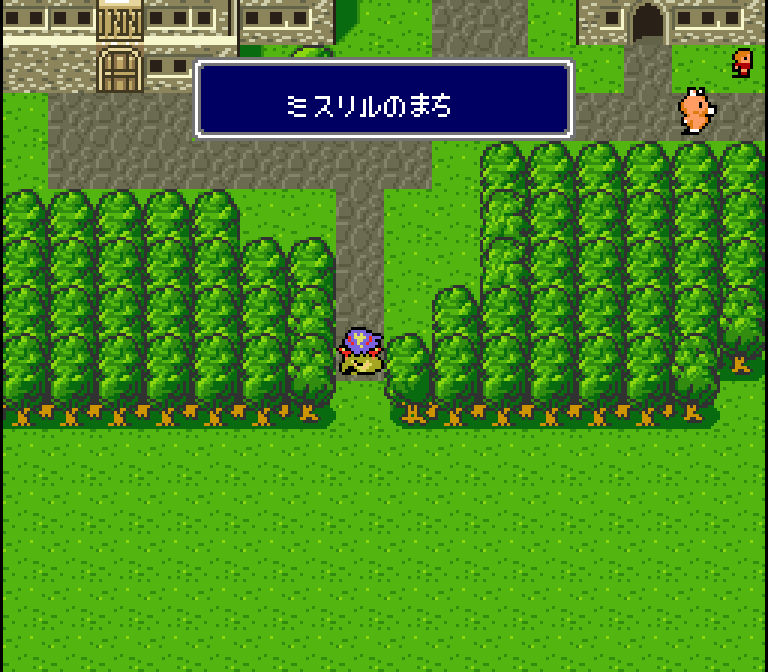 | 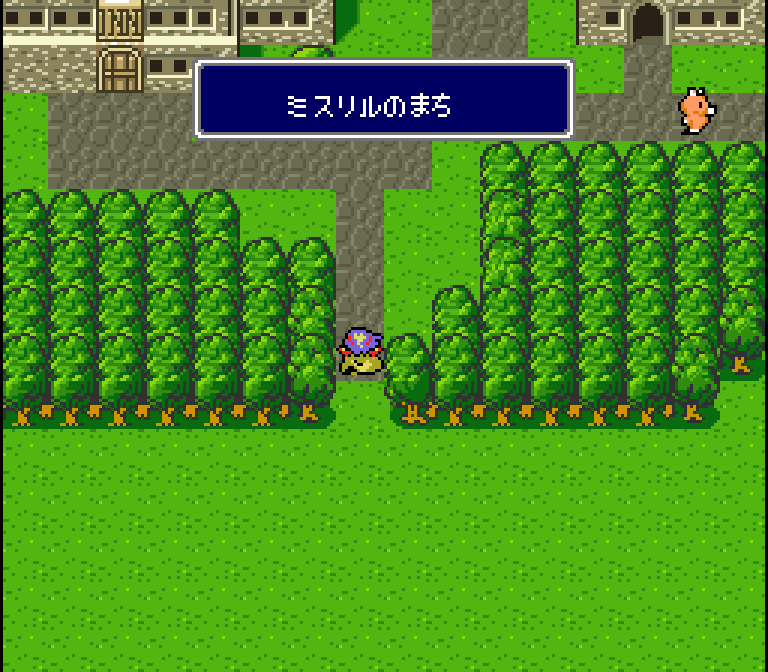 |  |
| Final Fantasy IV (Original) | Final Fantasy IV (Easy Type) | Final Fantasy II (Super NES) |
There’s a small town on an island north of Mt. Ordeals. In the Japanese version of the game, it’s simply called “Mythril Town”. In the English Super NES release, it was changed to “Silvera”.
 | 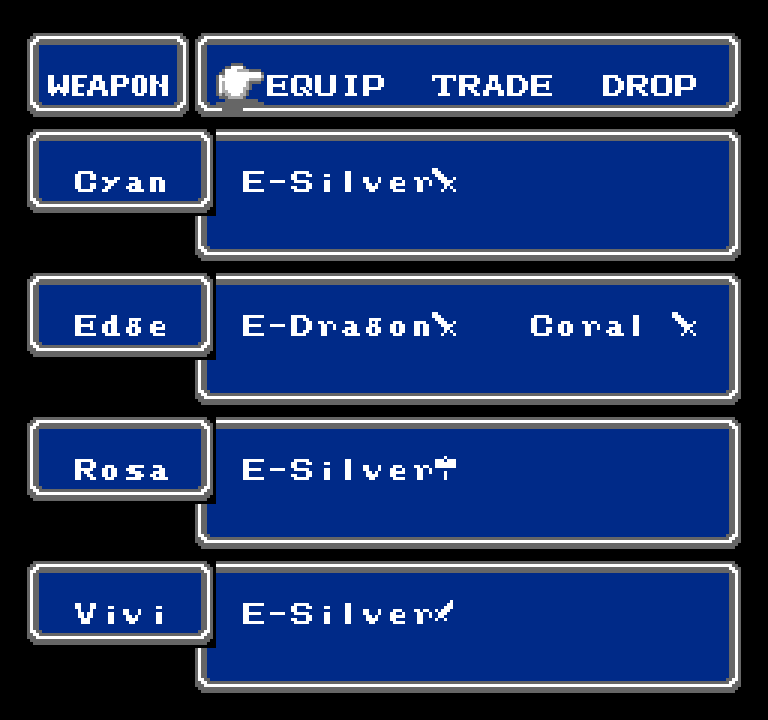 |
| Final Fantasy (Famicom) | Final Fantasy (NES) |
In fact, all the mythril/mithril references in the game were changed to silver. For reference, the term originated with J.R.R. Tolkien and his Middle-earth fantasy writings. So my initial guess was that the translators or localizers wanted it to be super-clear for the target audience that mythril equipment is made of metal, since metal equipment can’t be used in the next major dungeon.
Then I was like, “Hey, maybe I should see how this was handled in the first Final Fantasy game.” And yep! The mythril references in the first Final Fantasy game were changed to say “silver” for the English release too. So it seems like the Final Fantasy IV/Final Fantasy II translators were simply staying consistent with how the first Final Fantasy handled mythril.
Maintaining consistency in translations – especially ones that involve changes like this – can be pretty tough. So even though I personally think this change was silly and unnecessary, I gotta say good job to whoever was responsible for staying consistent!
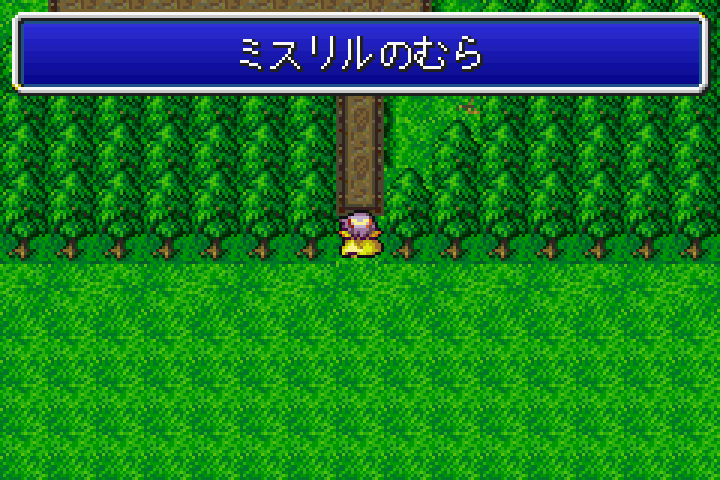 | 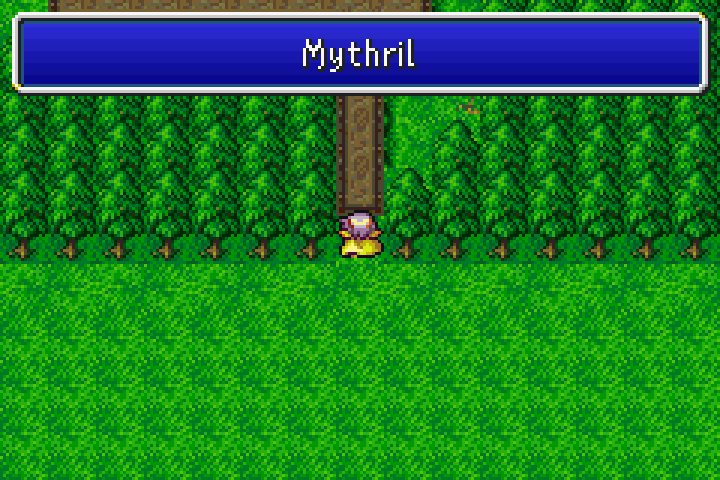 |
| Final Fantasy IV (GBA, Japanese) | Final Fantasy IV (GBA, English) |
Anyway, back to Final Fantasy IV. Apparently this town’s name changes from “Mythril Town” to “Mythril Village” starting with the Japanese Game Boy Advance release. Actually, it might’ve been changed starting with the Wonderswan release, but as I’ve never played it that far I can’t say for sure. Strangely enough, the GBA translation just throws out the whole town/village thing and simply calls the place “Mythril” now.
Silver Properties
When the original localizers changed the town’s name from Mythril to Silvera, they also renamed the town’s special “Mythril” equipment to “Silver” equipment. The change makes sense from a consistency standpoint, but it also has unintended consequences.
A little later in the game, there’s a magnetic cave that features a neat little gameplay curveball: if any characters are wearing metallic equipment in the cave, they’ll be hindered in battle, and this includes the equipment found in Mythril Town/Silvera. In real life, however, silver is actually non-magnetic. This isn’t widely known, so it’s by luck that the localizers’ mistaken assumptions and the players’ mistaken assumptions cancel each other out. But for knowledgeable players aware of silver’s properties, this was possibly a point of frustration – the game’s design almost makes it seem like the special Silver equipment is intended as a clever way around the magnetic cave’s gimmick.
Tiny Man
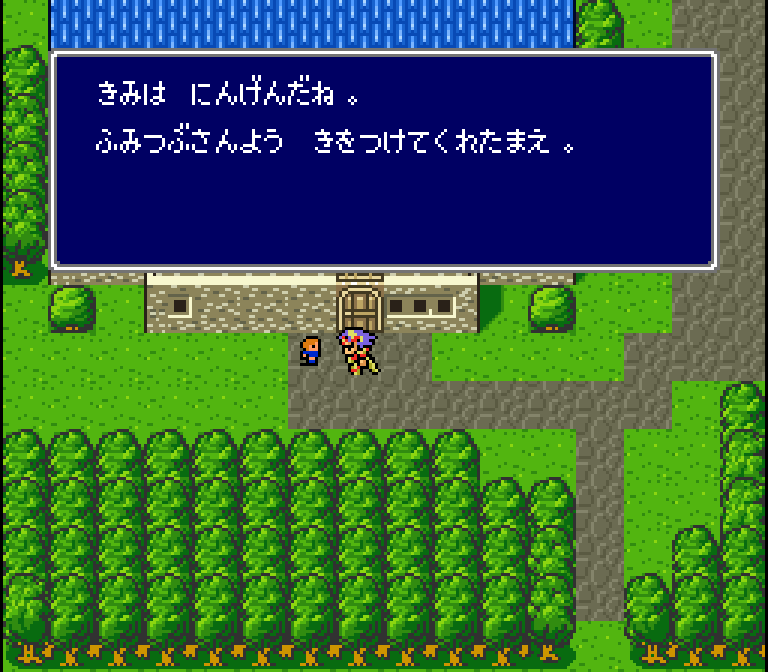 | 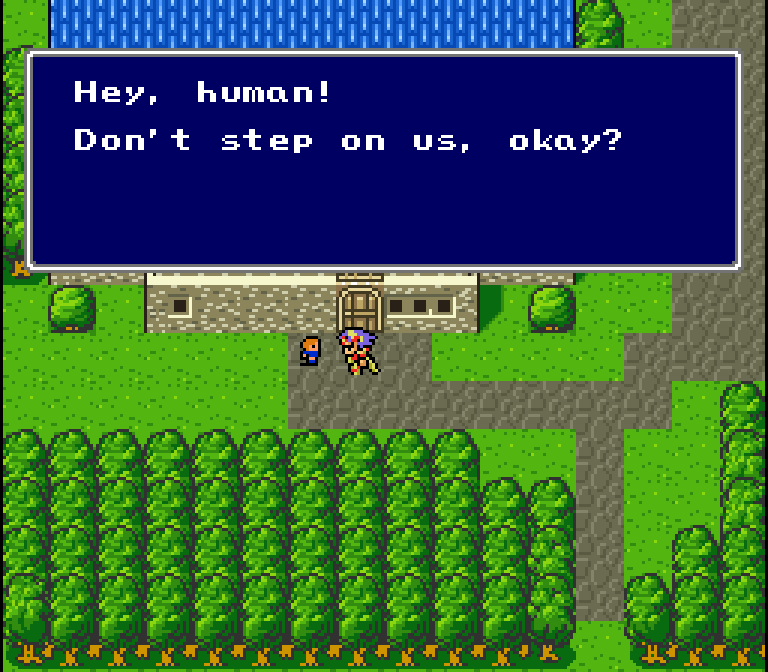 |
| Final Fantasy IV (Super Famicom) | Final Fantasy II (Super NES) |
One of the tiny guys near the town entrance says in English, “Hey, human! Don’t step on us, okay?”
This is basically an okay translation, although in Japanese he speaks in a pretty unusual, almost archaic style that’s rarely used in real life. He also speaks very formally and politely, although that isn’t really reflected in the English translation.
A slightly closer translation might be something like, “You must be a human. Please try not to step on us.” but even that sort of misses the weird nuance of his speech style. This just goes to show that it’s really hard to bring across Japanese speech nuances sometimes.
Race Relations
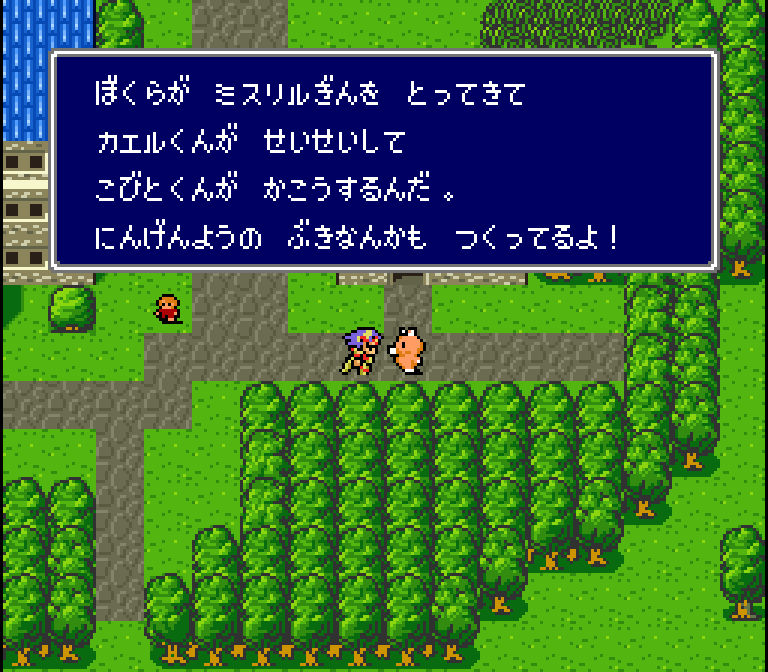 |  |
| Final Fantasy IV (Super Famicom) | Final Fantasy II (Super NES) |
A pig near the entrance lists the three races (species?) that live in the town and what jobs they perform.
| Japanese Version (basic translation) | English Translation |
| We go and gather the mythril silver, the Frogs refine it, and the Little People process it. | We mine silver ores. Toads refine and Small Folks process. |
| We make weapons and stuff for human use! | We make weapons for human use! |
So we see two different race/species names and we learn that each race performs a specific task. It’s interesting to see how the race names are handled in each translation, though:
- The original English translation calls them “Toads” and “Small Folks”.
- The PlayStation and Game Boy Advance translations call them “Mr. Frog” and “Mr. Little”.
- The fan translation doesn’t given the frogs a race name, but it does call the little guys “Little People”.
This is actually a really good example of how even the simplest of words can be translated in so many different ways. In a way, they’re all perfectly valid translations; different translators have different thought processes and will usually produce different translations.
For reference, the “Mr.” appears in one set of translations because the Japanese text adds “-kun” to the names. Sometimes this is just a sign of familiarity or camaraderie, while in other cases it might be a little closer to “Mr.”
The frogs/toads thing is understandable, too.
What’s most interesting from a translation standpoint is the race of little people. The word used is “kobito-kun”, which very literally means something like “(Mr.) little person/people”.
In any other game or property I might’ve translated this as “dwarf”… but there’s already a race called that in the game. So what else is there? “Midget” is a possibility, but I think even by the 1990s this wasn’t a very politically correct phrase to use. So it’s neat seeing how different translators handled it with “Small Folks”, “Mr. Little”, and “Little People”.
What do later translations use? If you were in charge of translating the game, would you go with any of these terms? Or do you have any better ones in mind?
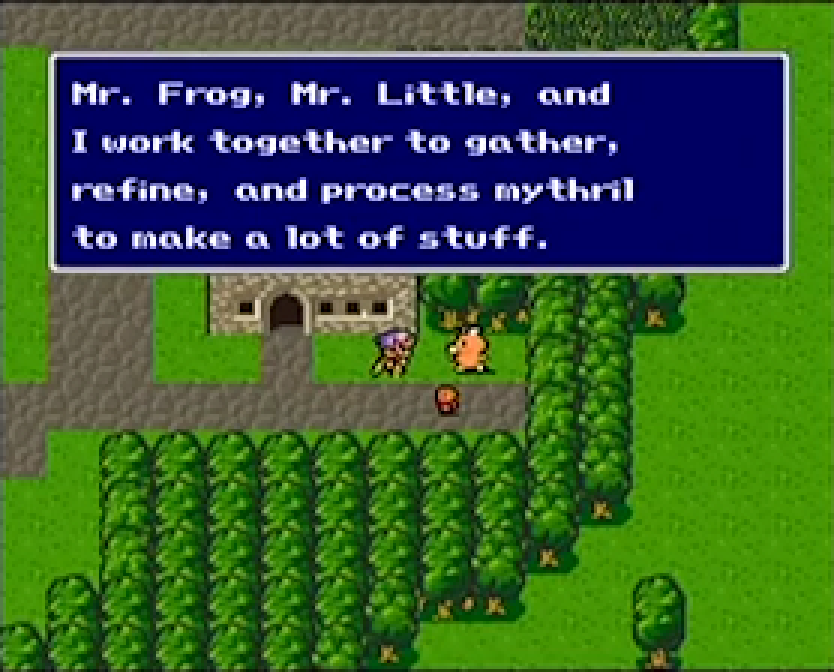 |  | 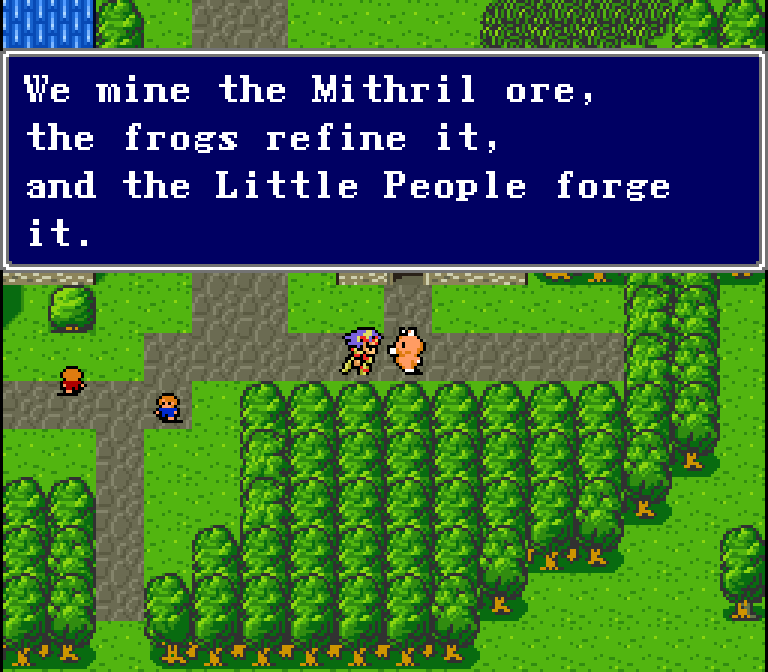 |
| PlayStation translation | Game Boy Advance translation | J2e fan translation |
Actually, to get a little nitpicky, the PlayStation translation and the Game Boy Advance translation muddle this line up a bit and make things less clear – in particular, it’s not clear which race performs which task anymore.
Here’s the PlayStation translation:
Mr. Frog, Mr. Little, and I work together to gather, refine, and process mythril to make a lot of stuff.
The Game Boy Advance translation is basically the same, except it makes things a little clearer:
Mr. Frog, Mr. Little, and I work to gather, refine, and process mythril to make armor and weapons.
So we see that the Game Boy Advance translation fixes up the PlayStation translation a little – but not all the way – by saying what exactly they make instead of “a lot of stuff”. Although both translations leave out the fact that all together they produce stuff for the human race to use.
Silver Fun
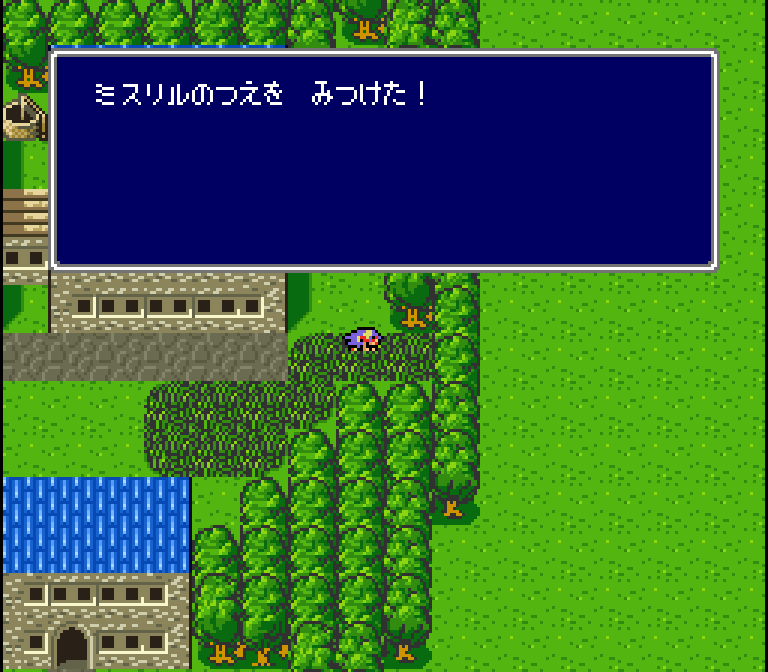 |  |
| Final Fantasy IV (Super Famicom) | Final Fantasy II (Super NES) |
As mentioned previously, all the mythril references in the game were changed to say “silver” instead. This includes all the mythril equipment in the game too.
This change is actually something I’d really like to ask the translators/localizers about someday, if I ever had the chance…
Human Dietary Habits
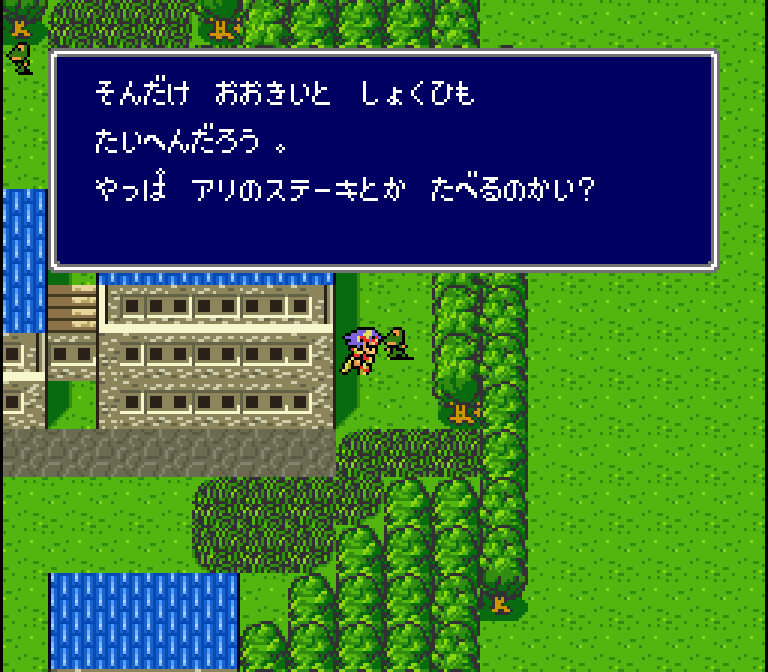 | 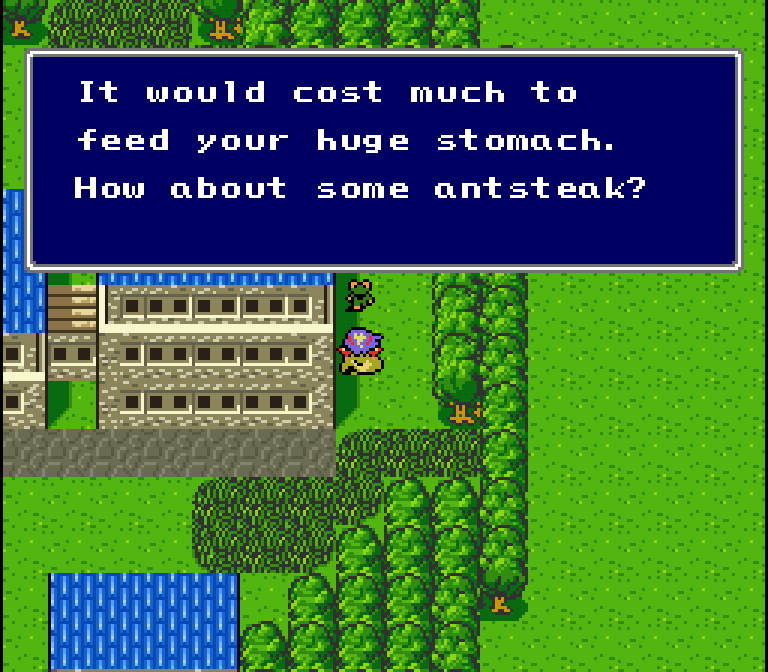 |
| Final Fantasy IV (Super Famicom) | Final Fantasy II (Super NES) |
A frog in the corner of town talks about how expensive eating must be for humans.
| Japanese Version (basic translation) | English Translation |
| Being as big as you are, food costs must be tough. | It would cost much to feed your huge stomach. |
| I assume you eat ant steaks and stuff like that? | How about some antsteak? |
We see that the English line makes a specific reference to stomachs while the Japanese version just gives a vague reference to your size.
That’s not a huge deal or anything, but the next line actually winds up being a trouble spot. In some specific situations, you might be able to take the second Japanese line to be an invitation, but in this specific context with this wording it seems fairly clear that it’s meant to explain why the frog thinks it would cost so much to feed you – because it thinks you eat tiny things too.
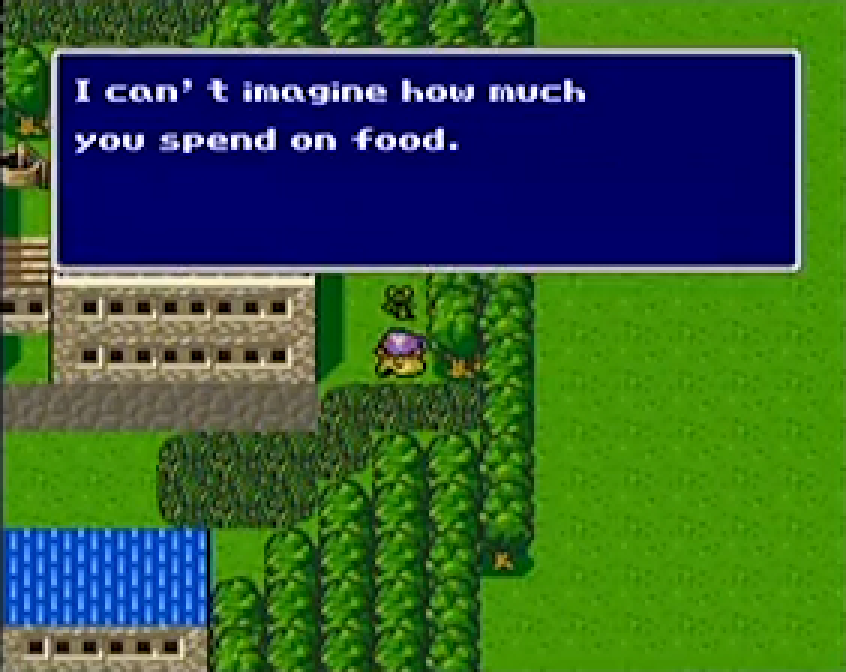 | 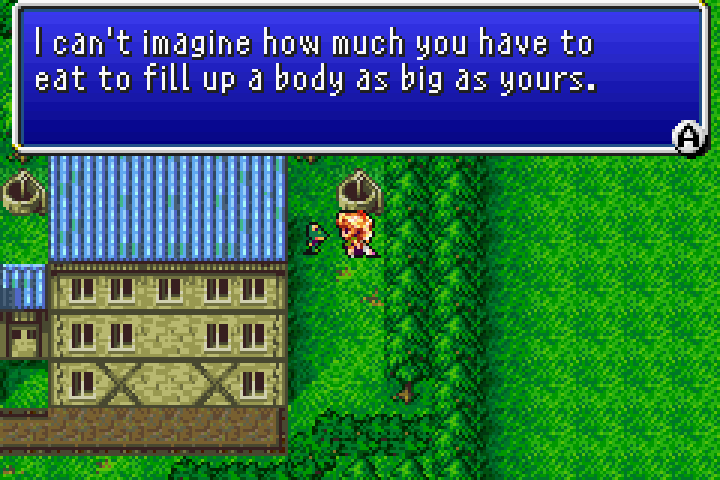 |
| PlayStation translation | Game Boy Advance translation |
In the PlayStation translation, this frog’s text changes to:
I can’t imagine how much you spend on food.
This translation fixes the original translation by removing the stomach reference, but it also leaves the size aspect of the line unstated. This is fine, it just leaves it up to the player to understand why the frog would make this statement.
The PlayStation translation also completely removes the line about ant steaks. I can only guess it’s because the translator didn’t know how to handle it. Removing it kills the joke the writers intended, though.
As seen before, the Game Boy Advance translation takes the PlayStation translation and tries to improve it. The result here is:
I can’t imagine how much you have to eat to fill up a body as big as yours.
Nice, the size thing has been added back in! …But the part about it being expensive has been removed. And the part about the ant steak is missing here, too.
In all, it seems like the PlayStation and Game Boy Advance translations miss the entire point of this frog’s text. Sure, it’s an unimportant line, but a quality, professional translation should properly translate unimportant lines too.
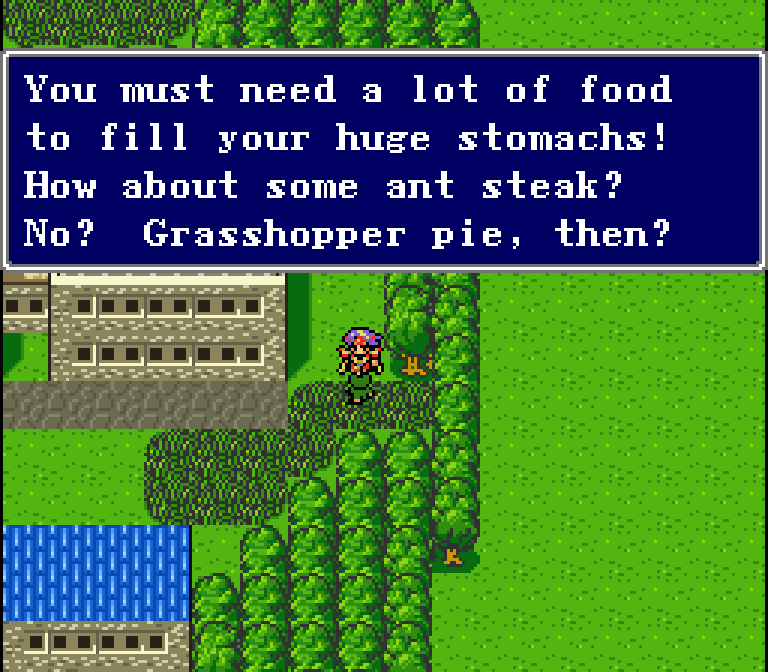
The fan translation handles this line with:
You must need a lot of food to fill your huge stomachs! How about some ant steak? No? Grasshopper pie, then?
At first it seems pretty good, but then these things pop out:
- The stomach reference is back, despite not being there at all in the original text. This again shows that the fan translation heavily relied on the official translation rather than acted as an actual retranslation.
- The whole point of the original line, the fact that it must cost a lot of money, is missing in the fan translation.
- The fan translation makes the same mistake as the original official translation and has the frog offering you food.
- The fan translation adds in extra stuff that wasn’t in the original version at all. Which would be fine in some cases, but not in what the fan translators touted as the definitive translation of the game.
That said, I do think the grasshopper pie thing was pretty clever! For those who aren’t in the know, a grasshopper pie is a sort of green, mint-flavored pie with a cookie crust. Here’s an example:
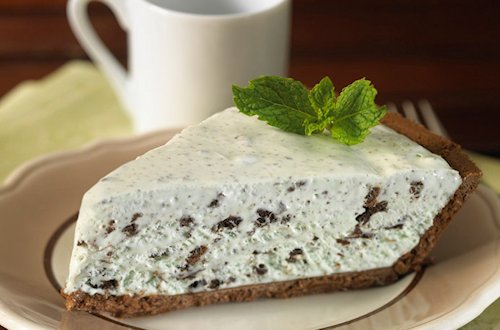
Since we’re already looking at so many versions of this line, here’s how the DS translation handles it too:
The gil you must spend on food! Probably can’t afford to eat much more than ant steaks, huh?
The DS translation definitely gets the intent of the original text. It rephrases things and rewrites things slightly to sound more natural – something you rarely saw in the early days of video game translation but is the industry standard now. I haven’t played the DS version very far myself, but the more I look at it, the clearer it becomes that it’s by far the current definitive translation!
Mine Ahead
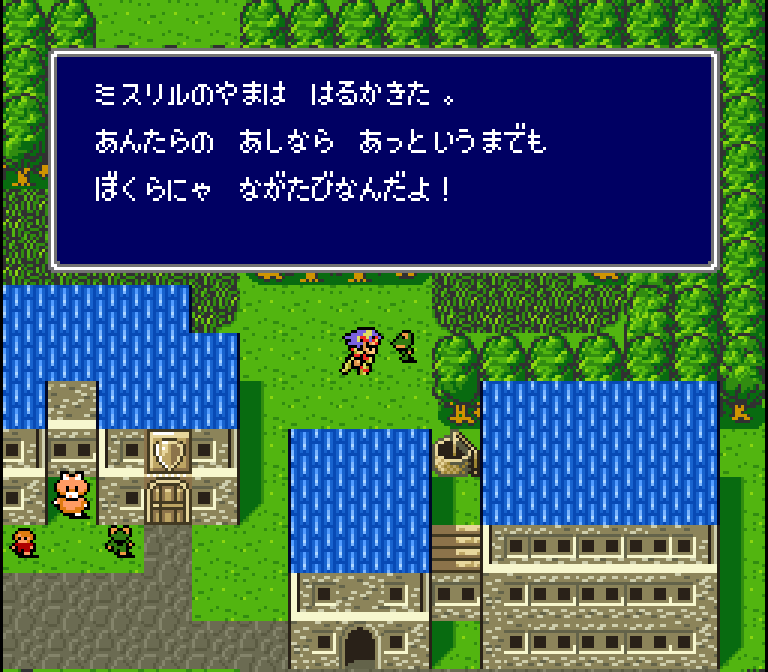 | 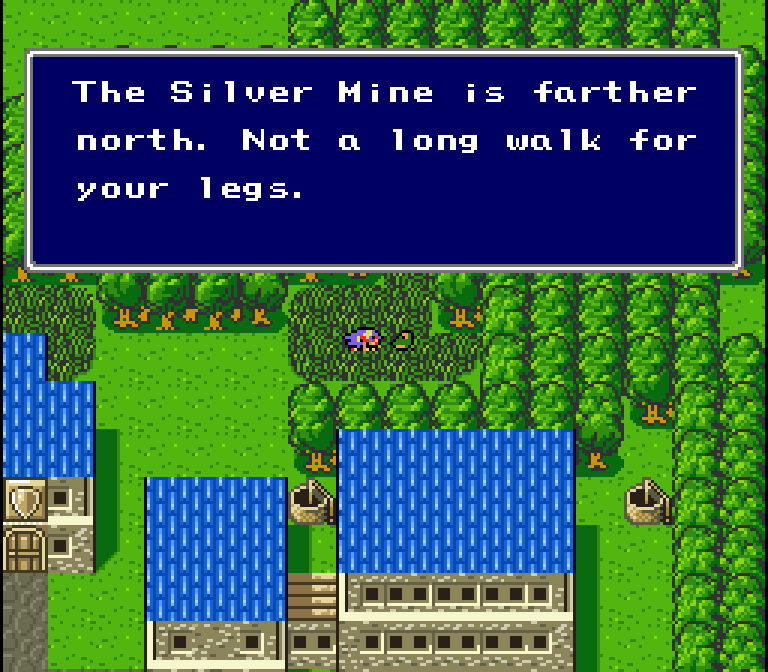 |
| Final Fantasy IV (Super Famicom) | Final Fantasy II (Super NES) |
Another frog in the town mentions where the ore mine is:
| Japanese Version (basic translation) | English Translation |
| The mythril mountain is far to the north. | The Silver Mine is farther north. |
| With your legs, you’d get there in no time flat, but for us, it’s a long trip! | Not a long walk for your legs. |
Looking at this, there are a few things that stand out:
- The “mythril mountain” became “Silver Mine”. I don’t even think it’s supposed to be a proper noun, just a general term that says it’s a mountain and it has mythril on it.
- The English translation almost seems to be speaking to RPG-playing instincts and giving a hint that says, “You should go north and visit this place that I’m mentioning.”…Except there is no place to visit. The point of the original Japanese line is simply that long trips for these tiny people are quick trips for normal-sized people. The use of “farther north” rather than “far to the north” compounds the problem.
- The English translation also misses the point further by removing the size/length comparison altogether.
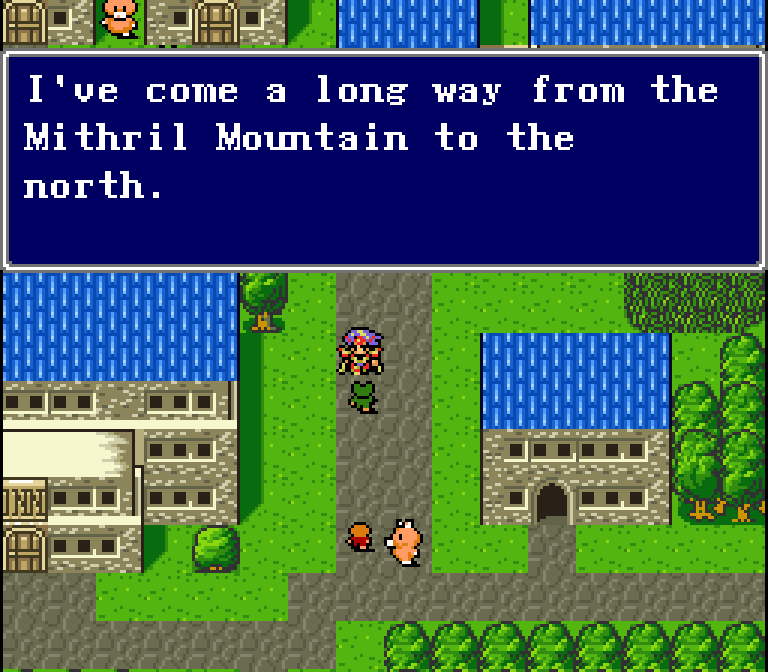
The fan translation handles this line with:
I’ve come a long way from the Mythril Mountain to the north. Even though you could get there in a minute with your long legs, it’s a long journey for us!
The first line here is absolutely wrong. The mistake is a simple one – the translator seems to have had some comprehension problems with the way “遥か~” usually works. It seems like they might’ve been unsure if きた (kita) was meant to be 来た (kita, "come") instead of 北 (kita, "north"), and compensated by using both words in the translation. It’s a weird slip-up to begin with and it’s hard to explain in English, but it’s basically a beginner’s mistake.
The second line is correct, though, so that’s good!
Dance Party
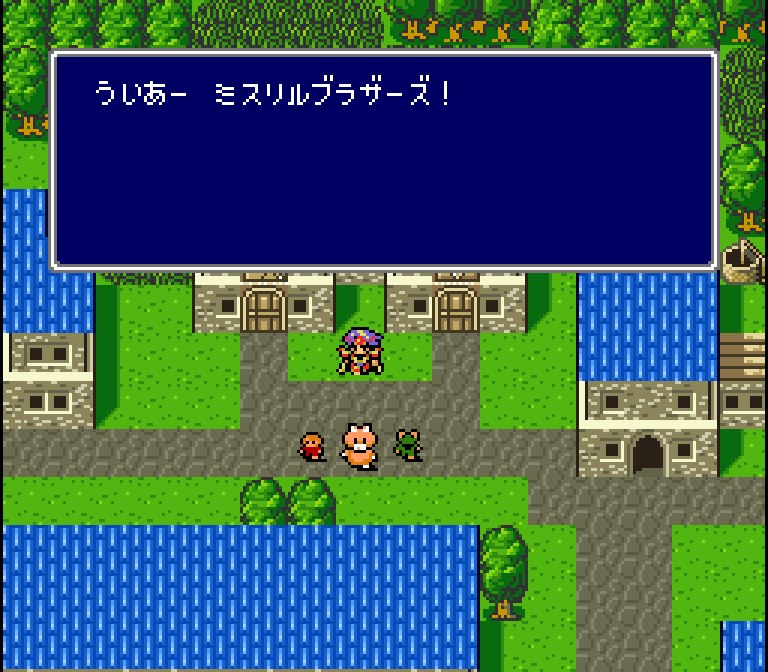 | 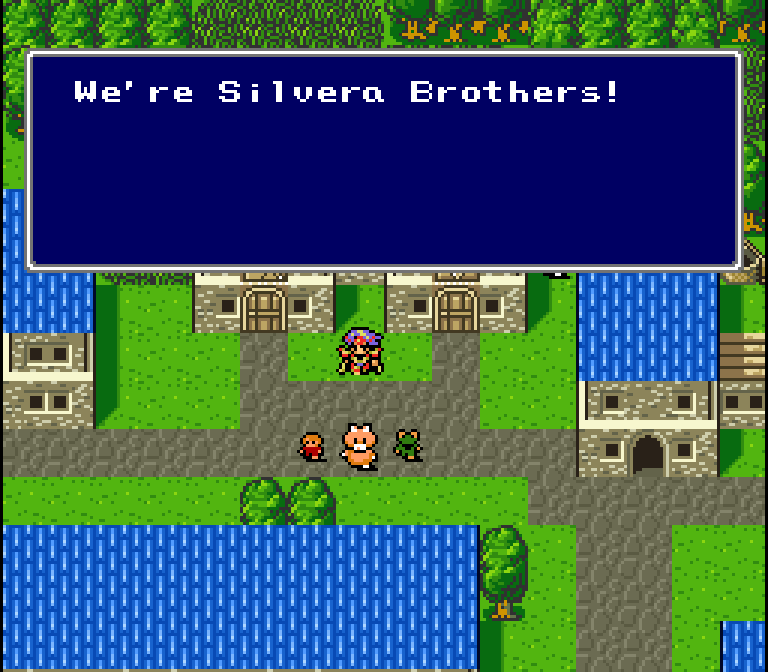 | 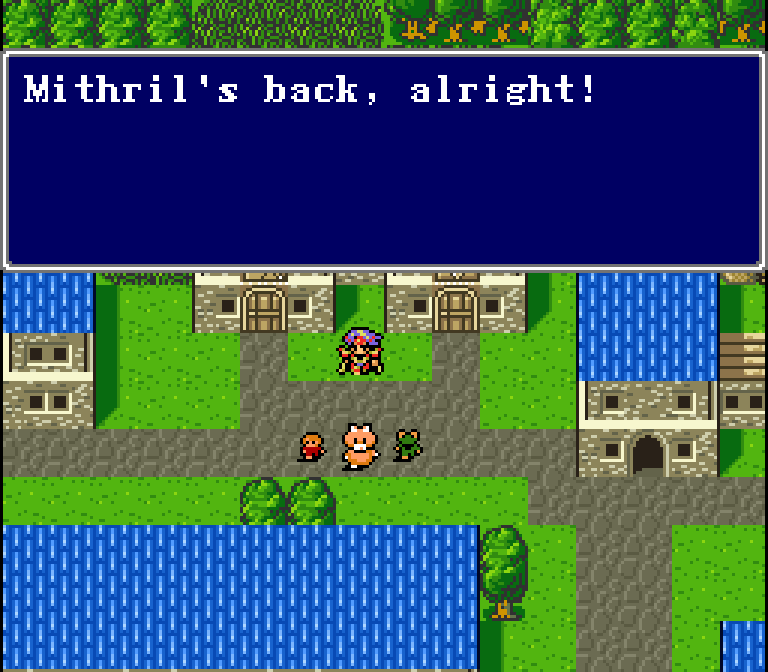 |
| Japanese release | Official translation | J2E fan translation |
A group of three citizens will do a dance for you if you talk to them. Their text is translated very differently in each translation, so let’s take a look. For reference, the first two lines are said by the tiny guy and the frog before talking to the pig.
| Japanese Version | SNES Translation | Fan Translation | PlayStation Translation | GBA Translation | DS Translation |
| Baby! | Hey! | Yeah, baby! Yeah! | S’up, G! | Awesome! | Hey! |
| Yeah! | Yeah! | Can ya dig it? | Yo-yo-yo! | Served! | Ribbit! |
| We’re gonna show ya a cool dance! | We’ll show you a great dance! | We’re the Mithril Boys! | Who you? | Did you come to check out our dance routine? | If you want to see real dancing, then you came to the right place, oink! |
| C’mon, brothers! | Come on, brothers! | C’mon everybody! Rock your body! | Who we? | You won’t be wasting your time! | Whaddaya say? |
| We are Mythril Brothers! | We’re Silvera Brothers! | Rock your body right! | We da Mithra Brothas! | Hey all, we’re the Mythril Brothers! Are you ready to get your groove on? | We’re the Mythril Brothers! |
| Let’s dance! | Let’s dance! | Mithril’s back, alright! | Yo, hit it! | Let’s do it! | Are you ready for this? |
| The dance finishes | |||||
| Thank you! | Thank you! | Thank you! | Yeah. | Yeah! | Thank you! Thank you very much! |
Whew! I haven’t seen the PSP version or iOS version or whatever other zillions of versions might exist or might someday exist, but I think that’s a pretty good list for comparison purposes. Here are some of my thoughts:
- First, the original Japanese text uses some English words to sound cool and trendy. The problem is that whenever Japanese speakers try this, the grammar is usually not 100% correct. Hence things like, “We are Mythril Brothers!”
- The original translation actually sticks surprisingly close to the original, minus the Silvera thing.
- The fan translation uses this scene as an opportunity to insert some more cultural references. The tiny guy gives an Austin Powers quote:
Meanwhile, the pig gives a ton of Backstreet Boys references. Here’s a quick look for reference:
The original Japanese text didn’t include any cultural references at all, so these were additions made by the fan translators to improve the game, as explained in the fan translation notes:
The game was designed for a Japanese audience, not an American one. I’m certain everyone in the EMU community knows about the American Final Fantasy II. The story is a retelling of the classic good vs. evil: Light vs. Dark. In Western culture, we have a number of beautiful literary works that immediately spring to mind: Paradise Lost, The Divine Comedy, Morte d’Arthur. However, reading Final Fantasy II was about as appealing as actually reading one of those books for an English/Literature class. The story had so much promise; we decided to make it in the image of Western civilization.
I don’t really see how Austin Powers and the Backstreet Boys make the story better, but everyone’s opinion is different. If anything, I think these cultural references, along with other ones like the Pulp Fiction reference earlier in the game, really date this translation and make it feel old and outdated now. I guess that’s one of the prices a localizer has to pay when inserting cultural references.
- The PlayStation translation goes maybe a bit overboard with the hip hop talk. The Game Boy Advance translation then tries to dial it back a little bit.
- The DS translation is a bit far from the original text too, but this is probably because the whole scene plays out differently. I also don’t have any easy way of checking the Japanese text for this scene; it’s possible the Japanese text was changed here too.
It’s definitely been interesting seeing how this scene has been translated over the years. I’m sure there will be plenty more Final Fantasy IV ports and remakes in the future, so I look forward to seeing how they handle this dance stuff too!
Little Girl, Big Trouble
 | 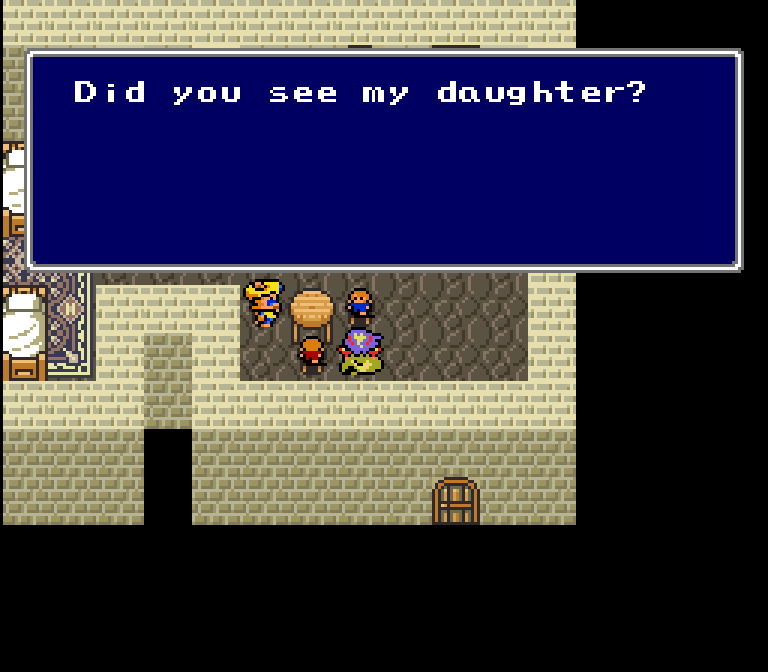 |
| Final Fantasy IV (Super Famicom) | Final Fantasy II (Super NES) |
Inside the inn are a couple of tiny people. One of them says:
| Japanese Version (basic translation) | English Translation |
| Good grief, is having a pretty daughter ever tough! | Did you see my daughter? |
That’s a pretty big change there, I wonder how it came about. The translation almost seems like the opposite of the original line in a weird way.
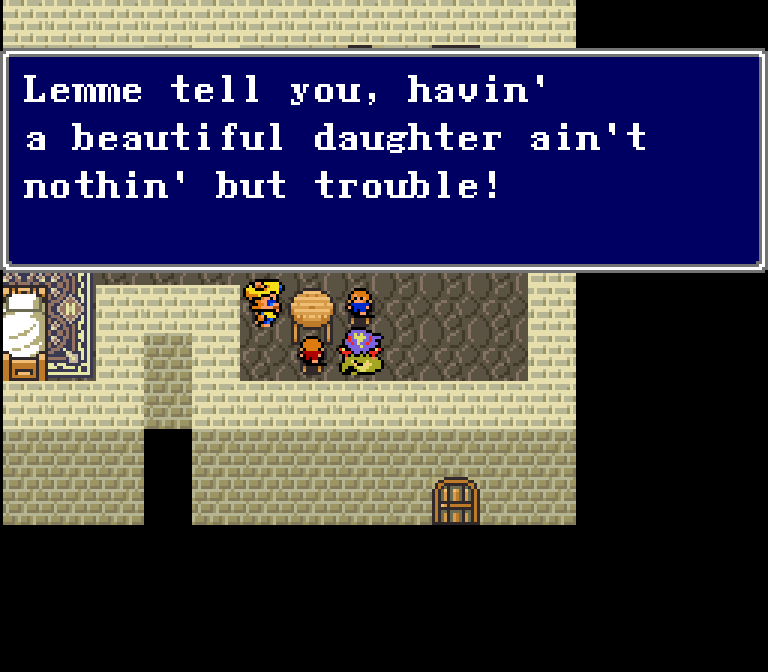 | 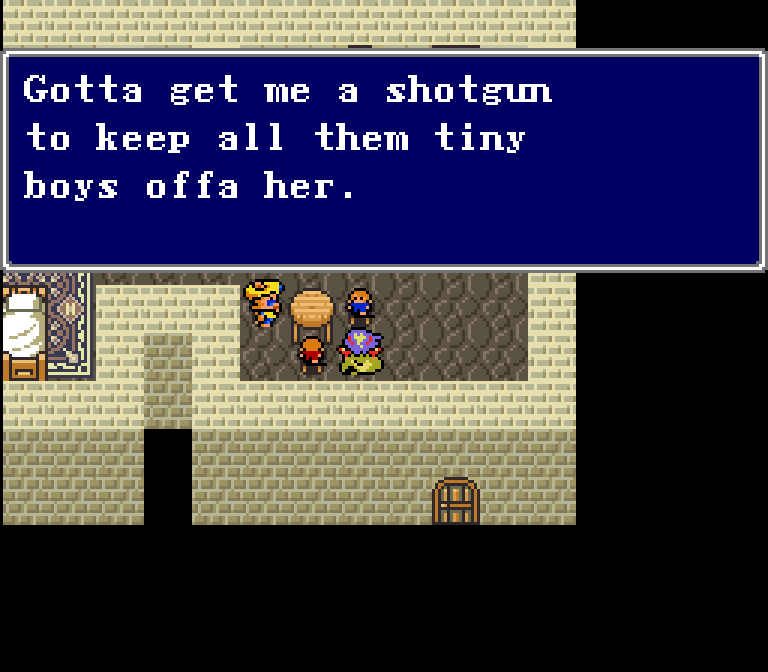 |
| Final Fantasy IV (Super Famicom) | Final Fantasy II (Super NES) |
Taking a look at other translations of this guy’s text causes a bit of confusion, though. For example, the fan translation has this guy say:
Lemme tell you, havin’ a beautiful daughter ain’t nothin’ but trouble!
Gotta get me a shotgun to keep all them tiny boys offa her.
At first, I was flabbergasted by the shotgun reference – are there even guns in this game, aside from cannons?
I also thought that the fan translation added that entire second line out of nowhere… but nope! Checking the PlayStation translation and the GBA translation, we see that this guy does indeed have a second line of text.
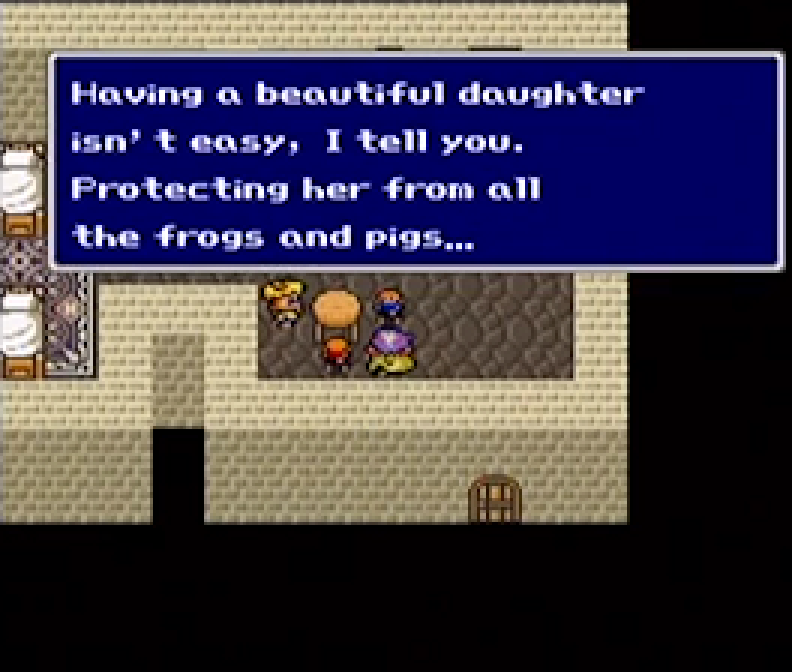 | 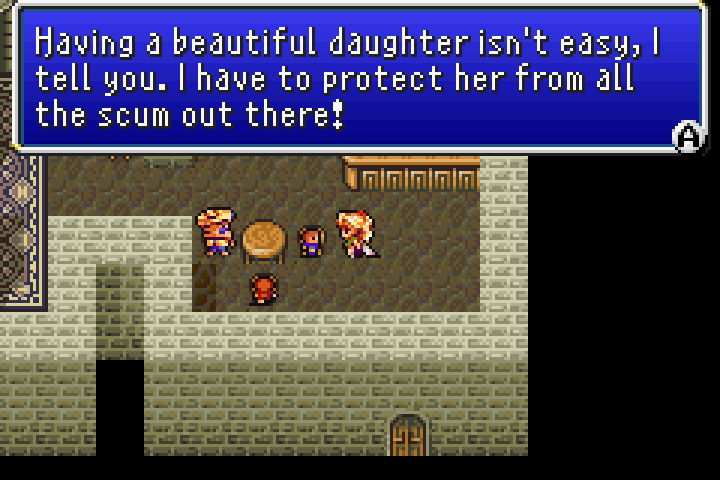 |
| PlayStation translation | Game Boy Advance translation |
The PlayStation translation has this guy say:
Having a beautiful daughter isn’t easy, I tell you.
Protecting her from all the frogs and pigs…
The Game Boy Advance translation goes like so:
Having a beautiful daughter isn’t easy, I tell you.
I have to protect her from all the scum out there!
So what’s the deal? From Japanese text dumps that I’ve checked, this extra line isn’t in the original game. Maybe it was added to later Japanese versions? That seems kind of doubtful, though.
It just seems really strange that this new line would appear in the PlayStation, GBA, and the fan translations… unless the PlayStation translation made it up out of nowhere (which is entirely likely) and then the fan translation and the GBA translation used that line as a base (which is also extremely likely).
If anyone can shed light on this, please let me know!
Little Beauty
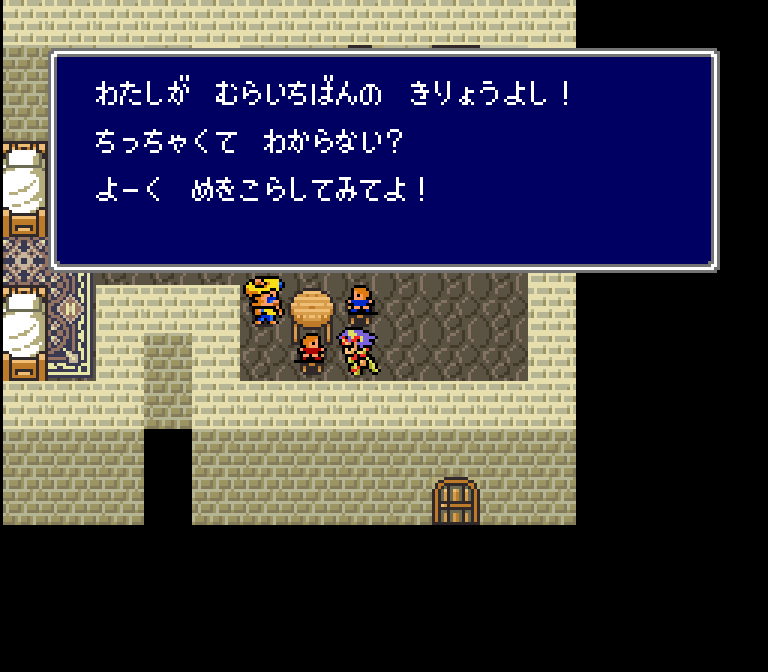 | 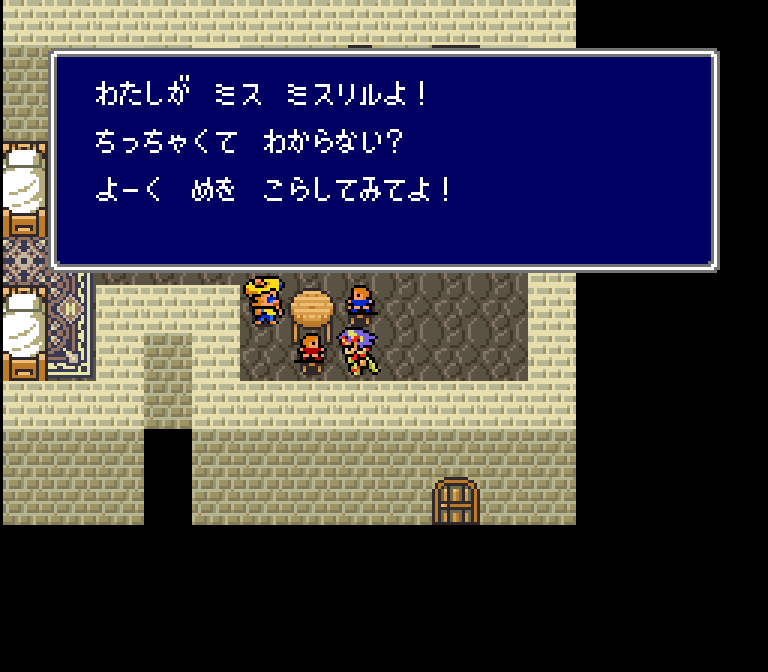 | 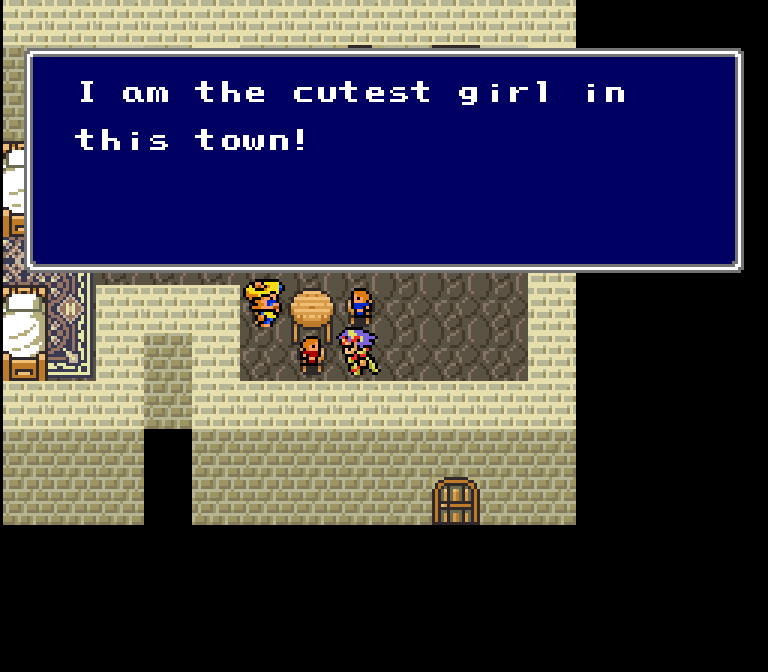 |
| Final Fantasy IV (Original) | Final Fantasy IV (Easy Type) | Final Fantasy II (Super NES) |
The other tiny person at the inn is apparently a girl:
| FFIV (basic translation) | FFIV Easy Type (basic translation) | FFII |
| I’m the most ravishing girl in the village! | I’m Miss Mythril! | I am the cutest girl in this town! |
| Am I too small to tell? | Am I too small to tell? | |
| Take a realllly close look! | Take a realllly close look! |
Here we see another instance of the Easy Type script rewording things to be more easily understandable for younger audiences. I can definitely see the original Japanese term being above an average kid’s vocabulary level, so this change makes sense.
The English translation, though, cuts out two of the sentences and loses some of the fun of the original text. Now she’s just making a statement for no reason rather than making a comment on how it must be hard to see the tiny people’s unique details.
Also, we’ve seen in a few other instances where the Easy Type script and English script share script changes, but in this case the English script pulls from the original script.
Lastly, not that it’s particularly important, but we see that she refers to this place as a “village” in the original script while the game calls it “Mythril Town” when you first enter. Later Japanese releases fix this minor inconsistency by renaming it “Mythril Village”, as we saw earlier.
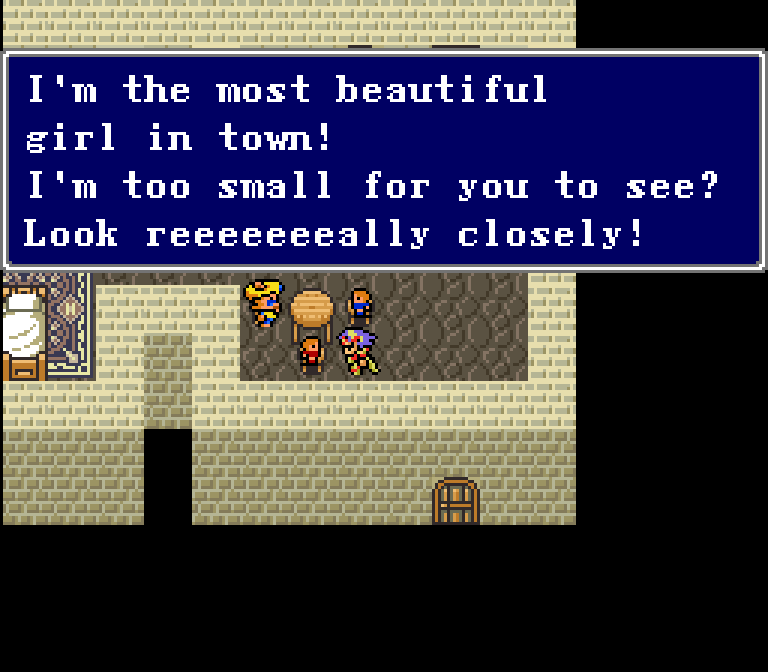
For reference, the fan translation handles this line with:
I’m the most beautiful girl in town! I’m too small for you to see? Look reeeeeeeally closely!
Nice! The fan translation gets it right and doesn’t add anything crazy or use the Easy Type script as a base.
So Long, Sword
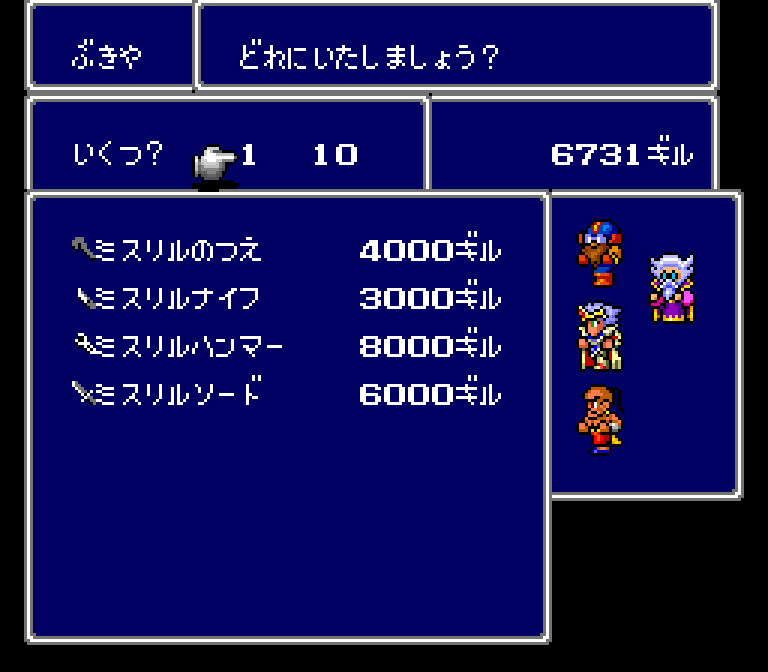 | 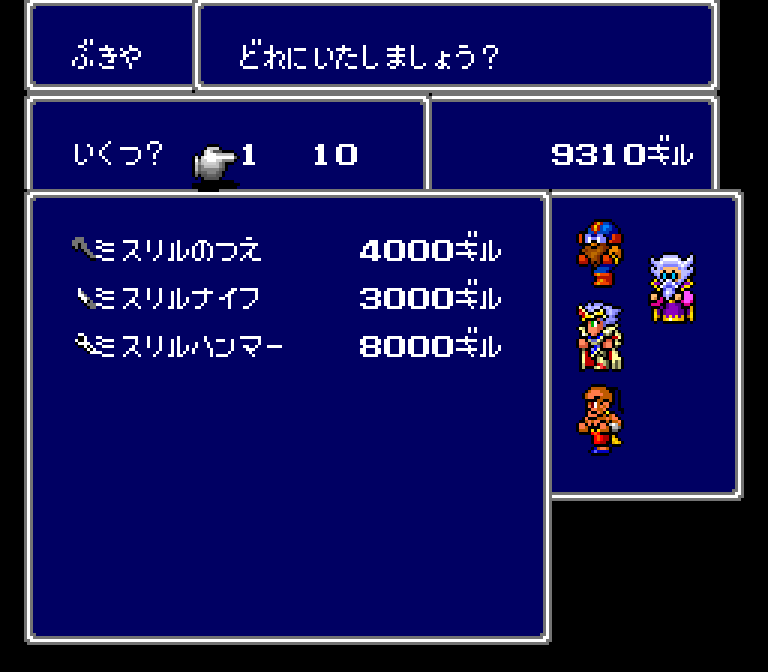 | 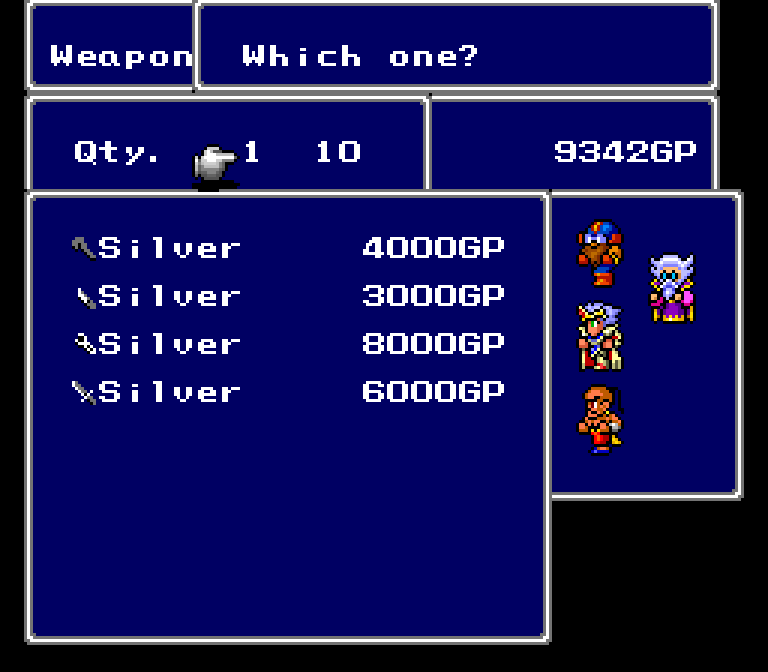 |
| Final Fantasy IV (Original) | Final Fantasy IV (Easy Type) | Final Fantasy II (Super NES) |
As we saw earlier, the Easy Type version of the game replaces the Mythril Sword/Silver Sword with a “Piglet Sword” and makes it available for free in Baron Castle.
Normally the weapon shop in this town sells the Mythril Sword/Silver Sword, but not in Easy Type, since the sword no longer exists.
I guess the developers could have left the Piglet Sword available for purchase here, but it wouldn’t really fit with the theme of this town making mythril/silver equipment. So it looks like they put a pretty good amount of thought into things when making this weapon change in Easy Type.
Item Compression
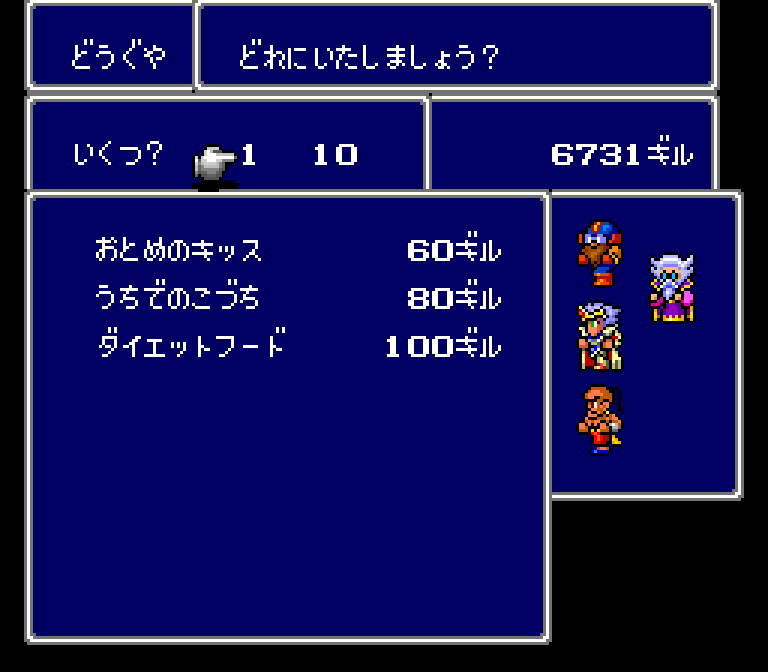 | 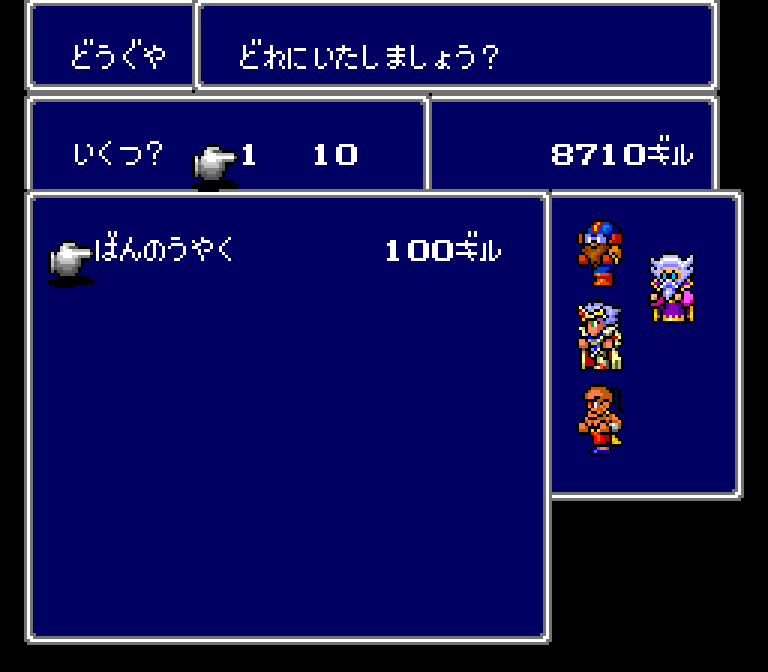 | 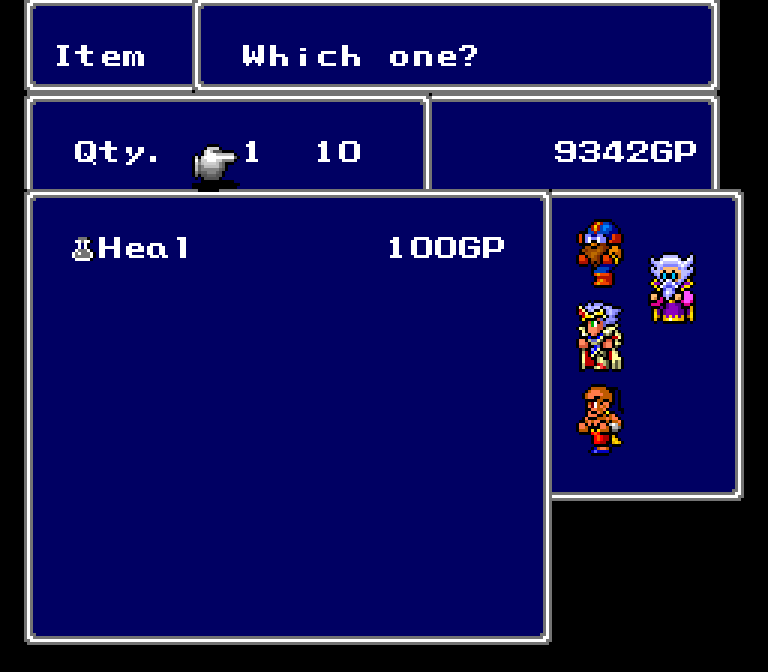 |
| Final Fantasy IV (Original) | Final Fantasy IV (Easy Type) | Final Fantasy II (Super NES) |
In the original Japanese release of the game, the item shop here sells three items:
- Maiden’s Kiss
- Midget Mallet
- Diet Food
Each of these items removes a specific status ailment. The Maiden’s Kiss removes the frog/toad ailment, the mallet removes the status ailment that turns you into a little person, and the Diet Food item removes the pig status ailment.
Actually, the Japanese word used for the “Midget Mallet” is “uchide no kozuchi”, which is a legendary hammer that appears in Japanese fairy tales and such. As such, it doesn’t have an exact English translation – in Secret of Mana it was translated as “Midge Mallet” while other games sometimes call it a “Lucky Mallet”. For more info, see here.
Anyway, these specific status ailment-removing items are available here, in a town full of people who might be afflicted by these ailments, so it kind of fits the town’s theme in a silly way. But since Easy Type and the English release only have a single item that removes all status ailments, this shop now only sells that one item.


![press start to translate [Final Fantasy IV] press start to translate [Final Fantasy IV]](https://legendsoflocalization.com/wp-content/uploads/2019/08/bbenma.png)
Wow, I want some grasshopper pie now!
Having watched through the FFVI comparison streams and now reading this, I’m constantly assaulted by feelings of embarrassment for those fan translations. They remind me of sitting around in elementary school staring at a text book and having the teacher insist to the class over and over again “Yes, that’s what it says in the book, but I want you guys to write that *in your own words!!!*” and feeling like, well, this isn’t enough to bother rewording it (seriously, we’re looking at a single sentence and you want us to reword it? why?). We were being asked to bs it, really, and that’s what these fan translations have done to almost entire game texts. Taken something where we all already knew what it said and what it meant, but flipping the wording around to make the elementary school teacher think you wrote it yourself. Nothing is added or clarified, I just feel like I’m reading a classmate’s pointless homework.
Speaking of fanslations, years ago I had commented on a YouTube video showing the Celes suicide attempt scene (I looked it up to see what the censorship was about, of course). I asked which fan translation for SNES I should try, and I wasn’t interested in playing it on another system. Boy, I was surprised by the response I got! Someone responded with the feeling of “ugh, god, another one… (facepalm/rolls eyes)” and told me that the fan translations weren’t really that good, and the original text is pretty much fine as it is! I was just like, well, okay, but I already know that one, I’m interested in something new! Anyway, now I know why that person reacted the way they did, and I kind of want to go find that comment and tell them so. I did eventually try playing a fanslation (unsure which) but didn’t get far at all and vaguely remember having mixed/confused feelings about whether I could recommend it.
So, Silver is a pretty apt translation for Mythril, if the translators wanted to avoid a Tolkien reference, as Mithril is often described as silvery and it’s sometimes referred to in-Universe as “true-silver”.
It was possibly meant to be inspired by Titanium or Aluminum…. neither of which are magnetic. But apparently Final Fantasy Mythril is ferromagnetic?
As to the translation calling it silver – silver and iron are incompatible, but silver and nickel aren’t, so the armor could be a nickel silver alloy… I guess? Or it could just be fancy steel armor with silver trim/inlays, to indicate quality. (I’m reaching here.)
There is one thing to note that I find fascinating. In the Japanese fairy tale 一寸法師 (Issun-boshi, or the inch high samurai), the tale generally ends with the princess using the uchide no kozuchi to make the aforementioned tiny samurai into a full grown adult. Consequently, a Japanese player would see that in the shop and know immediately what condition it treats.
Two of your labels look to be wrong — there are two side-by-side screenshots from the fan translation (“Lemme tell you, havin’ a beautiful daughter ain’t nothin’ but trouble!” and “Gotta get me a shotgun to keep all them tiny boys offa her.”) that are captioned “Final Fantasy IV (Super Famicom)” and “Final Fantasy II (Super NES)”.